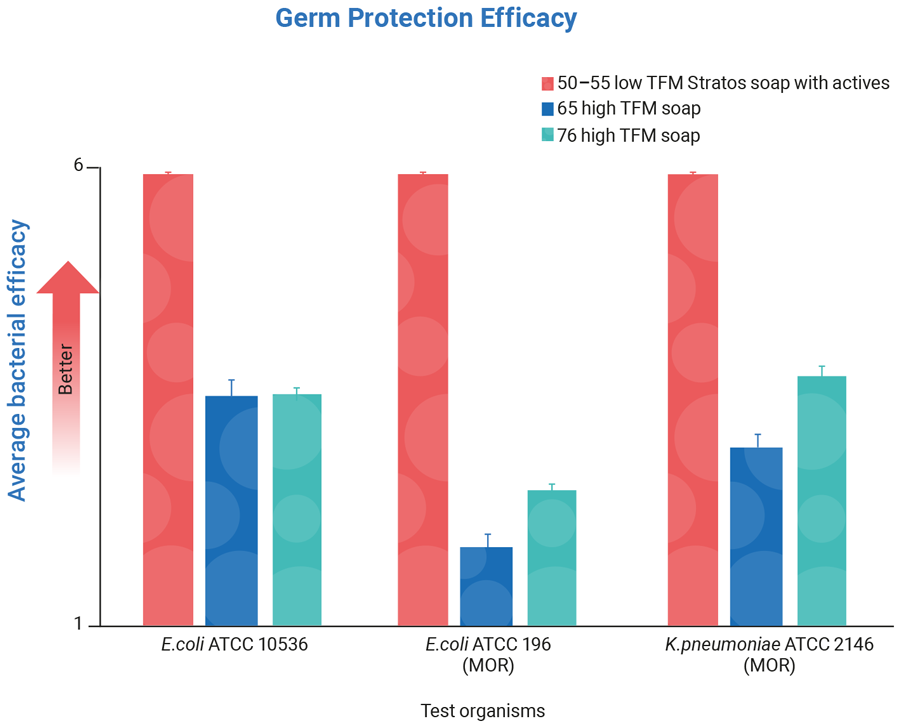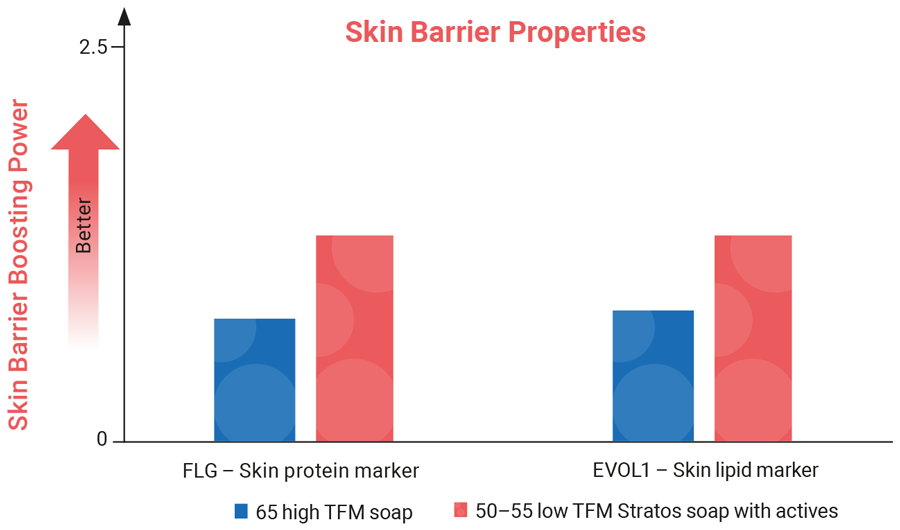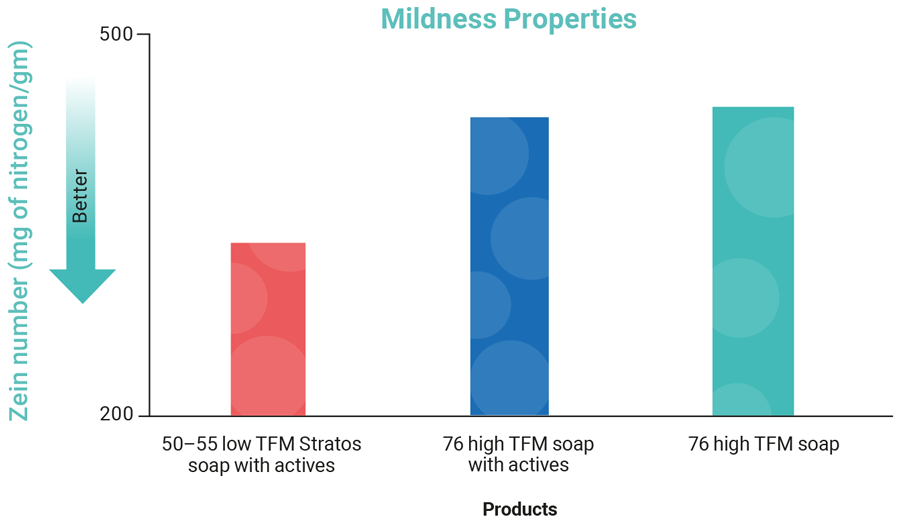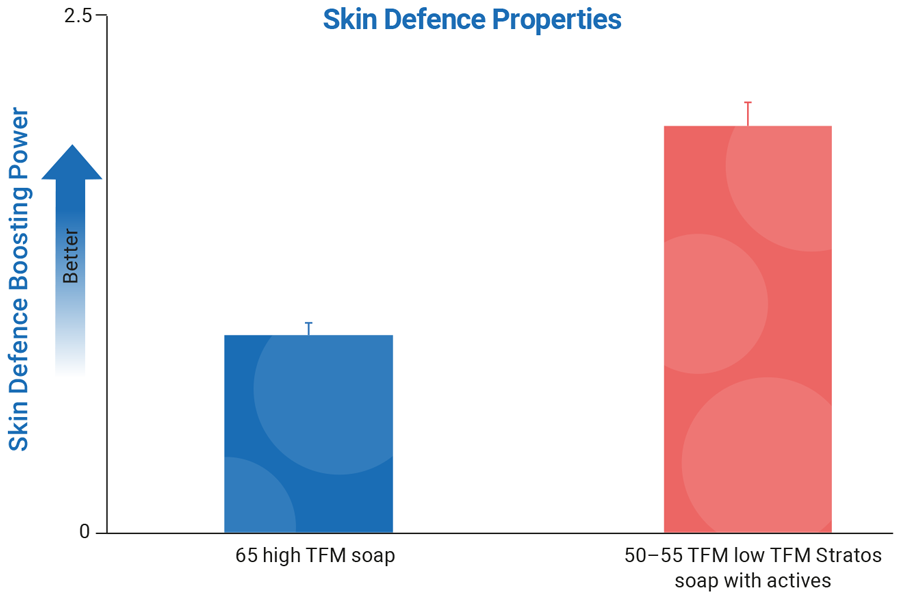- Environmental degradation and rising pollution levels are amplifying our vulnerability to skin infections. There’s increasing awareness that healthy skin is an essential foundation to overall health and wellbeing.
- The COVID-19 pandemic reinstated the importance of soap use as the most accessible and cost-effective intervention for protecting against infections transmitted via skin through touch.
- Unilever’s new Stratos technology reduces the amount of Total Fatty Matter (TFM) in soap while providing enhanced efficacy against infection-causing germs, resulting in stronger skin protection and more sustainable soaps.
- This innovation challenges the long-held belief that higher TFM equals better soap, offering an eco-friendlier and more beneficial alternative to conventional soaps.
The soap bar is one of the most widely used everyday personal hygiene products. The recent COVID-19 pandemic reminded us of its essential role as a potential lifesaving hygiene intervention. Soap continues to be relevant and important as probably the only personal hygiene practice continued post-COVID, for infection protection from germs transmitted through the skin.

In today’s context, environmental degradation and rising pollution levels make us increasingly concerned about skin infections and skin barrier health. Novel innovations in cleansing technologies must address skin barrier protection in addition to the benefit of basic cleansing. Likewise, developing more sustainable technologies that reduce palm oil content is now imperative for responsible soap manufacturing. However, balancing enhanced skin health benefits, superior hygiene efficacy, and reducing palm oil consumption is no easy task. Up to the challenge is a team of scientists at Unilever R&D, led by Dr Vibhav R. Sanzgiri (Executive Director R&D HUL and Global Head R&D Skin Cleansing, Unilever).

Refuting the notion that a high content of palm oil or fat – termed Total Fatty Matter (TFM) – is essential for soap effectiveness, the team has developed the innovative Stratos technology that replaces up to 25% of ‘non-essential’ TFM with plant-based polysaccharides and other skin benefit agents.

Not only does this technology reduce the oil content in soap, but studies show that the new technology has unparalleled cleansing efficacy and, when formulated with actives, it has enhanced antimicrobial benefits for skin protection.
Innovating future-ready protection
Studies conducted by the researchers at Unilever R&D demonstrated that their novel low TFM Stratos bars matched the high TFM bars in cleansing efficiency on skin, an essential feature for germ protection during daily cleansing (see Table 1).


65 high TFM soap.
The bars remove dirt and grime effectively, but what about their ability to fight germs? In studies following internationally accepted in vitro testing methods, it was shown that lower TFM bars with Stratos technology and actives outperformed ordinary high TFM soaps by considerably more than ten times. The results are indicative of a stronger protection against bacterial strains representative of stomach and respiratory infections, a continuous threat affecting children and adults alike.

With an increasing number of infections due to antimicrobial resistance (AMR), it was important to establish efficacy of the lower TFM Stratos bars with actives on antibiotic-resistant bacteria. Reassuringly, the results showed superior efficacy by more than ten times against AMR strains as opposed to ordinary high TFM marketed soap bars (see Figure 1).
The team has developed the innovative Stratos technology that replaces up to 25% of ‘non-essential’ Total Fatty Matter with plant-based polysaccharides and other skin benefit agents.
The role of soap gained much prominence during the pandemic as a lifesaving recommendation by leading health authorities worldwide. It is therefore imperative to ensure innovations in soap maintain efficacy in protecting against known and emerging viral infections. With scientific testing as per internationally recognised methods, the low TFM Stratos soap with actives delivered over 99.9% efficacy against the H1N1 virus, matching the efficacy of the high TFM soap with actives (see Table 2).
Skin as the first line of defence
Conventional high TFM soap technologies focus on removing what gets accumulated on the skin’s surface but don’t necessarily consider the impact on its structure and function. The researchers at Unilever understand the importance of developing soap technologies that consider the skin’s overall health, not just surface cleanliness.

The skin is the largest organ in the human body. It has several important roles, including protecting against mechanical, thermal, biological, microbial, chemical, and physical hazards. It is therefore of little surprise that the skin plays a vital role in supporting the body’s self-defence system against potentially harmful pathogens like bacteria or viruses in addition to acting as a physical barrier to pathogen entry.
This vital organ has a number of other ways by which it fights off microbial invaders through its own defence mechanisms. Barrier health and presence of antimicrobial peptides (AMPs) play a critical role in contributing to the skin’s defence function by resisting survival of pathogens on its surface.
A healthier barrier that prevents entry and survival of infection-causing germs enabled by Stratos bars provides superior skin protection.
The novel Stratos technology harnesses the science of natural defences to improve skin resiliency against pathogens.
The researchers investigating the impact of Stratos technology on skin – using in vitro, ex-vivo and clinical approaches – found these soaps to be superior. In standard Zein tests, low TFM Stratos soaps with actives were found to be milder, and the skin showed 25% less protein damage compared to the high TFM bars (see Figure 2).
In addition to mildness benefits, this novel technology is capable of enhancing the skin’s own defences against pathogens. In dermatological models that assess the impact on skin defence, Low TFM Stratos technology with actives is proven to double the boosting power of LL37, an important skin antimicrobial peptide against harmful pathogens.

Overall, the studies established that the low TFM Stratos bars were superior and delivered proven benefits of skin mildness while boosting skin hygiene barrier markers. A healthier barrier that prevents entry and survival of infection-causing germs enabled Stratos bars to provide superior skin protection.
Challenging the status quo
In countries like India, soap grading systems focus on TFM content rather than soap performance. Unilever’s research debunks the belief that higher TFM equates to better soap. Their low TFM bars with Stratos technology offer superior benefits for daily hygiene during cleansing, with stronger protection against germs and skin barrier health. This research underscores the need for a shift towards performance-based soap standards with proven consumer benefits, prioritising hygiene, skin and sustainability benefits over traditional metrics.
How is this innovation different from other soaps that offer germ protection?
Unilever is the world’s largest manufacturer of soap/bathing bars, which often is the only product consumers use on their skin for beauty and personal hygiene. We are, therefore, raising the functional superiority and the consumer benefits of our soaps to deliver consumer proven skin health and hygiene benefits by replacing wasteful total oil content (TFM) in soap bars with natural materials like plant polysaccharides and skin benefit ingredients.











